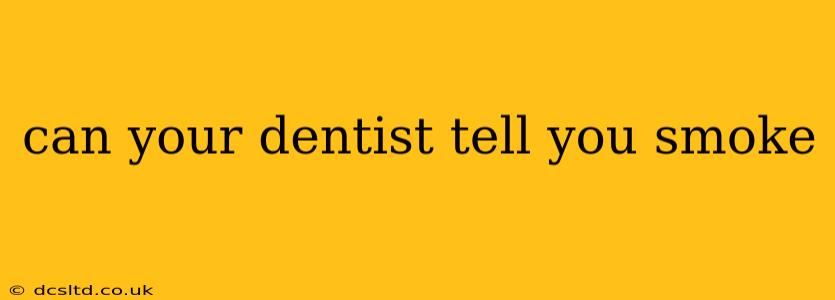Can Your Dentist Tell if You Smoke?
Yes, your dentist can often tell if you smoke, and sometimes even how much you smoke. They have several ways of detecting smoking, going beyond just the obvious smell of smoke on your breath. This is because smoking significantly impacts oral health, leaving behind telltale signs that a trained professional can readily identify.
How Can Dentists Detect Smoking?
Dentists employ a variety of methods to detect smoking habits. These include:
1. Visual Examination: This is the most straightforward method. A dentist can visually identify several oral health issues strongly associated with smoking:
- Yellow or brown staining of teeth: This is perhaps the most recognizable sign. Nicotine and tar in cigarettes stain the teeth, making them appear yellow, brown, or even dark brown, depending on the duration and intensity of smoking.
- Bad breath (halitosis): Smoking leaves a lingering unpleasant odor in the mouth that's difficult to mask completely. The smell is distinct and easily identifiable by dentists.
- Gum disease (gingivitis and periodontitis): Smoking significantly increases the risk of gum disease, causing inflammation, bleeding gums, and ultimately tooth loss. Dentists can assess the health of your gums during a routine examination. Advanced gum disease often shows up as receding gum lines and exposed tooth roots.
- Oral cancer lesions: Smoking is a major risk factor for oral cancer. Dentists regularly check for any unusual lesions or growths in the mouth during examinations. Early detection is crucial for successful treatment.
- Delayed healing: Smoking impairs the body's ability to heal, meaning wounds in the mouth, such as those from extractions or other procedures, may heal much slower in smokers.
2. Examining Medical History: While not a direct indicator, your dentist will review your medical history during your appointment. If you’ve declared yourself a smoker, it will be noted. This information is important for assessing your overall health and for tailoring the treatment plan accordingly.
3. Saliva Tests (Less Common): While not routinely used, some dentists might utilize saliva tests to detect biomarkers associated with smoking. These tests are becoming more sophisticated and can potentially provide more precise information about smoking habits.
What if I Don't Want My Dentist to Know I Smoke?
It's important to understand that your dentist's primary goal is to provide you with the best possible oral healthcare. Hiding your smoking habits prevents them from providing the most appropriate advice and treatment. For example, if you have gum disease exacerbated by smoking, the dentist can develop a treatment strategy to manage it effectively only if they are aware of this contributing factor. Honesty ensures your dentist can offer tailored advice on quitting smoking and managing the associated oral health risks. They can also help you find resources to assist in quitting.
Can My Dentist Tell How Much I Smoke?
While a dentist cannot precisely quantify the number of cigarettes smoked per day, the severity of the staining, the extent of gum disease, and the presence of other oral health issues can provide an indication of the intensity and duration of smoking.
Ultimately, open communication with your dentist is crucial for optimal oral health. Be honest about your lifestyle choices so they can provide the best possible care and support.
